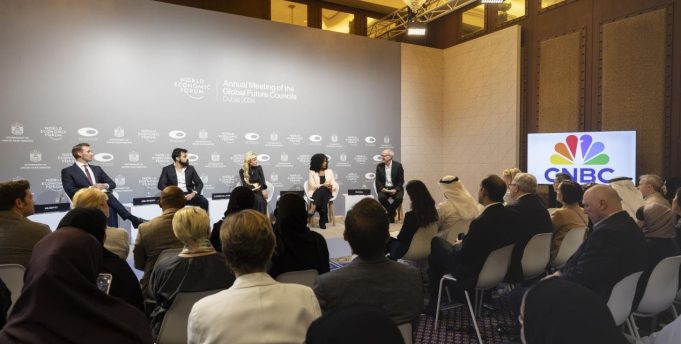Adaptability, trust, and a shift in education are crucial to preparing the workforce of the future, according to leading industry experts speaking at the Annual Meeting of the Global Future Councils 2024, a partnership between the UAE Government and World Economic Forum (WEF). The panel session, titled “Skills in the Age of AI”, centered on AI’s transformative impact on jobs, the need for continuous learning, and addressing biases to create a more adaptable and inclusive workforce.
The panel included Nela Richardson, Chief Economist and ESG Officer at Automatic Data Processing (ADP); Stuart Russell, Professor of Computer Science at the University of California, Berkeley; Jo O’Driscoll-Kearney, Chief Learning Officer at Majid Al Futtaim Holding; and Abdallah Abu Sheikh, Founder and CEO of Astra Tech.
Russell discussed how AI systems may surpass human capabilities, emphasizing that this disruption is no longer theoretical but imminent.
“By the end of this decade, we may have AI systems that exceed human capabilities in every dimension. There isn’t a job that AI wouldn’t be able to do cheaper and better, raising complex questions about employment,” Russell said, pointing to the challenges this will pose for employers and policymakers.
Abu Sheikh discussed the immediate impact of AI on labor-intensive jobs, noting that while AI will automate repetitive tasks, it will also create opportunities for new roles.
“AI will initially take over repetitive, labor-intensive jobs, giving humans more time to focus on other tasks. This shift will necessitate the creation of new types of jobs that didn’t exist before,” he said, emphasizing the potential for AI to spur creativity and strategic thinking.
However, Abu Sheikh expressed concern that current educational systems are not keeping up with technological advancements.
“We’re entering a period where formal education is lagging behind. The traditional four-year degree may no longer be enough to prepare people for an AI-driven future,” he noted, underscoring the importance of continuous learning and adaptability.
Bringing a data-driven perspective, Richardson pointed out that many companies are missing the opportunity to invest in their workforce’s skills, even as AI rapidly reshapes industries.
“We found that less than 4% of 53 million workers were upskilled by their companies over two years. This highlights a significant opportunity to leverage AI in fostering continuous learning and building a truly skilled workforce,” Richardson said, urging companies to view AI as a catalyst for talent development, not just automation.
O’Driscoll-Kearney shifted the focus to the ethical dimensions of AI, emphasizing that biases within AI systems reflect those of the developers who create them.
“We train AI with our own biases. If you have a brain, you have bias. The systems we develop reflect that bias, and it’s something we need to address,” she said, calling for more inclusive approaches to AI development.
She concluded by emphasizing the need for metacognitive skills—self-awareness and critical thinking—to navigate the challenges posed by AI. “In addition to adaptability, metacognitive skills – the ability to step back and assess how you think – will be more important than ever as AI continues to evolve. It’s about critical thinking, not just doing,” O’Driscoll-Kearney added.
AMGFC24, is taking place from 15-17 October in Dubai. The 2024 edition features 30 councils and over 500 participants from 80 countries, including experts, thought leaders, senior government officials, and business leaders who are helping shape the agenda of the 2025 WEF Annual Meeting in Davos.









